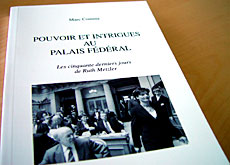Former cabinet minister bites back

The former cabinet minister, Ruth Metzler, has published a book detailing her bitter experiences in government.
In an interview with swissinfo, journalist Marc Comina talks about the power struggle which brought her down and the close-knit world of Swiss politics.
Metzler’s book, which is due out on Thursday, is guaranteed to be a bestseller. It is a frank account of her time in the cabinet, lifting the lid on an inner sanctum rarely seen by outsiders.
She also settles her account with her own party, the centre-right Christian Democrats, whom she accuses of hanging her out to dry in last year’s cabinet election.
Following the party’s dismal showing in October’s parliamentary elections, the Christian Democrats came under pressure to relinquish one of their two cabinet seats.
And it was Metzler rather than her party colleague Joseph Deiss – the current Swiss president – who was ousted in the cabinet election on December 10.
It meant that only one woman – foreign minister Micheline Calmy-Rey – was left in the seven-strong cabinet.
Marc Comina, parliamentary correspondent for the magazine, “Facts”, has documented Metzler’s fall in his own book, “Power and Intrigue in Parliament”.
swissinfo: Why did you write the book?
Marc Comina: After the parliamentary elections on October 19, it was clear that the Christian Democrats were likely to lose one of their two seats in government. I wanted to do a piece with either Joseph Deiss or Ruth Metzler, charting their every move in the run-up to the cabinet election on December 10.
Both ministers turned me down, but the idea was there. Then, the intense interest in this historic event, as well as the women’s question, persuaded me to do something.
swissinfo: Your sources – around 50 – all spoke anonymously. Is it difficult to write an inside account of the corridors of power?
M.C: It was easy in the end, but I was lucky. Every parliamentary correspondent has good contacts in Bern, but nobody knows everyone.
However, I was fortunate to have good contacts with Joseph Deiss, Ruth Metzler and the Christian Democratic Party. I realised I had to capitalise on this, because not everyone was in a position to carry out such an investigation.
swissinfo: Your book came out very soon after the events took place.
M.C: I do not know of any other examples in Switzerland of political books which have appeared so quickly. I hope it sets a precedent and that we can become a little more like English-speaking countries, where they are used to exposing the world of politics.
This way of doing things puts pressure on politicians. Indeed, if they know that events are being followed closely, they are more likely to be transparent.
swissinfo: You spoke to neither Joseph Deiss nor Ruth Metzler. Is this a shortcoming? Would the book have been different had you been able to?
M.C: The book would not have been any different, because all the information came from their close colleagues. Of course, Metzler’s book will reveal more about her own experiences and state of mind. But, from the point of view of the facts, there will not be any great differences.
Not having spoken to Ruth Metzler is actually an advantage. Some people suspect me of having taken her side. As I haven’t spoken to her, I can’t be mistaken for her “spokesman”.
As for Joseph Deiss, it is obviously regrettable that he did not contribute to the book. I would have liked to ask him some serious questions about his actions at the time. Deiss has the image and the reputation of a man who always wants to avoid conflict. But in this book, I show how he assisted without flinching in sacrificing his party colleague, and how his entourage undermined his rival.
Fundamentally, it is normal for a politician to fight for survival. It’s just the methods that are questionable. However, Joseph Deiss has not taken responsibility for his actions. It would have been welcome if he had done this publicly.
swissinfo: Was there any political reaction to your book?
M.C: There was a lot of reaction in the media. But the discussions mainly centred on the theory of a plot against Ruth Metzler, a term that I do not use myself in my book and which oversimplifies the issue.
Beyond that, there was really no discussion and maybe there won’t ever be. However, there are many political issues which merit further discussion.
For example, I quote an official report of a meeting of the [centre-left] Social Democrat parliamentary group where female party members admit to having done nothing at all to ensure the presence of two women in government. This revelation differs appreciably from the party’s official position on the issue.
swissinfo, Olivier Pauchard
Marc Comina was born in 1965.
After studies in Lausanne, he obtained a doctorate in French literature in Berlin, then taught in the United States.
He returned to Switzerland and took up a career in political journalism.
He is parliamentary correspondent for the German-language weekly magazine, Facts.
October 2003: The rightwing Swiss People’s Party takes 63 (+12) of the total 246 seats in parliament. The centre-right Christian Democratic Party loses 7 seats and is left with 42.
The Swiss People’s Party demands a second seat from the weaker Christian Democrats.
December 10, 2003: The Parliament elects a new cabinet. The Christian Democrats stand behind their two incumbent ministers, Joseph Deiss and Ruth Metzler.
Ruth Metzler is challenged and beaten by Christoph Blocher, de-facto leader of the People’s Party.
Her party colleague, Joseph Deiss, is re-elected.
Ruth Metzler accepts defeat and quits politics, leaving just one woman in government – the Social Democrat, Micheline Calmy-Rey.

In compliance with the JTI standards
More: SWI swissinfo.ch certified by the Journalism Trust Initiative











You can find an overview of ongoing debates with our journalists here . Please join us!
If you want to start a conversation about a topic raised in this article or want to report factual errors, email us at english@swissinfo.ch.